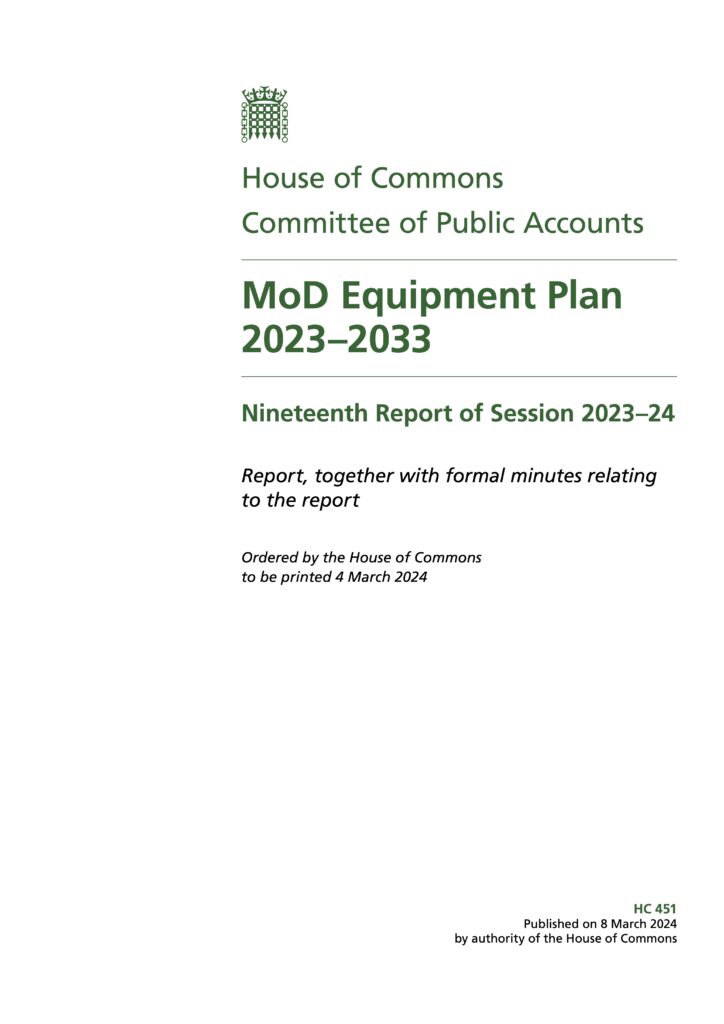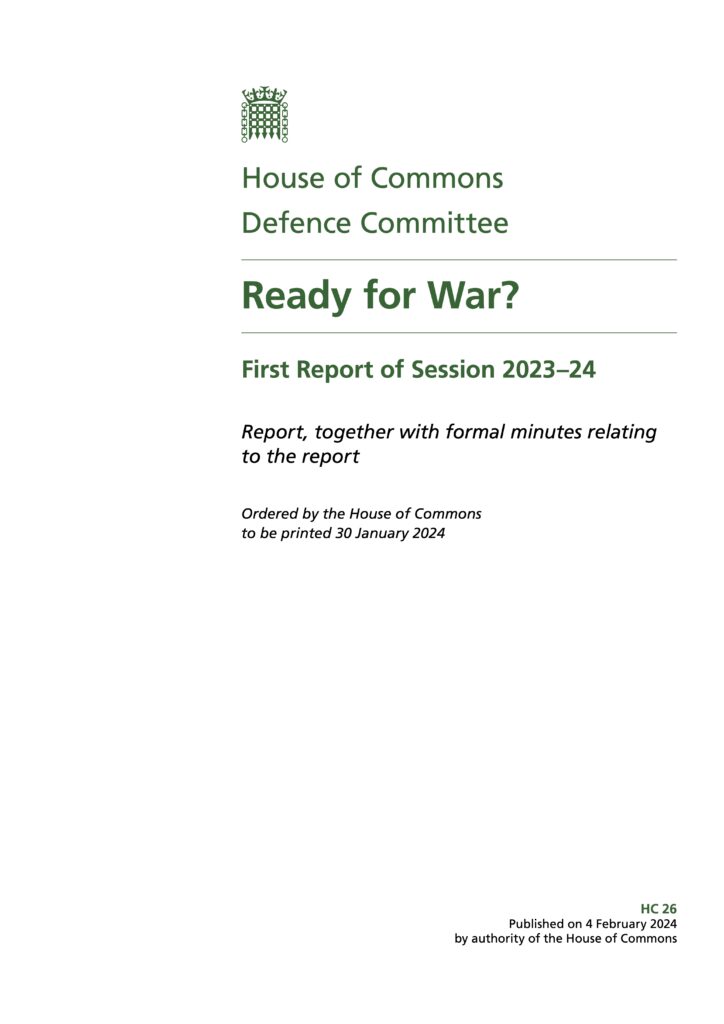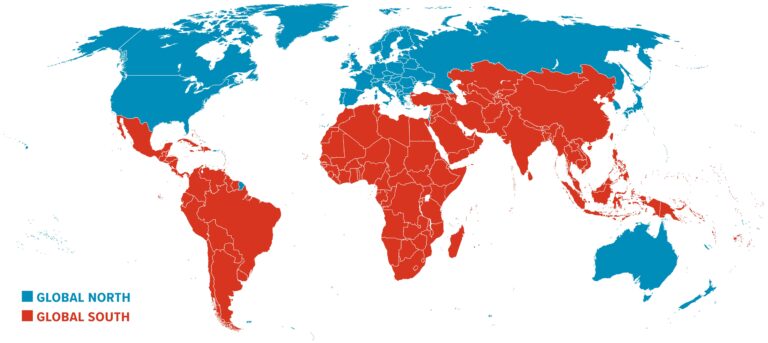
Air Marshal Edward Stringer (Ret’d) CB CBE
Senior Fellow
Last week saw two important speeches on defence reform. Speeches by two politicians on opposite sides of the House but who have both thought clearly about the failings of the Ministry of Defence (MOD). Those chronic problems have been saliently rehearsed by the recent House of Commons Defence Committee (HCDC) report into military readiness, and this week’s report by the PAC on the MOD’s equipment programme and its unaffordability.
Given recent polling ahead of the expected general election this year it is fair to assess both sets of ideas for their viability and the likelihood that they will address the concerns being raised, increasingly loudly, by the Legislature’s oversight committees. As Minister for Defence Procurement, James Cartlidge is embodying his proposals now; if Labour is elected and John Healey is made Secretary of State later this year, as the polls would seem to indicate, then he has laid down an unequivocal statement of what he will do “on day one” in office.
There is much to like in Cartlidge’s speech and the associated glossy that describes his vision of ‘Integrated Procurement’. (Though even some of his own officials have criticised the opaque, officialese jargon in which it was written.) Cartlidge arrived as Minister for Defence Procurement (MinDP) in April ‘23 with no previous exposure to military or MOD matters, and had the confidence to spot the wood before the trees of quotidian business captured his attention.
He has seen that under the Levene model the Services are incentivised to chase expensive perfection in each piece of equipment on their several wish lists. By the time the ‘perfect’ has arrived it is on the way to obsolescence, and we have missed the chance to acquire the ‘perfectly good enough’ much earlier. Especially so if the good enough is modular, has open software architecture, and is designed to be upgradable. Hence his emphasis on Spiral Development – getting stuff in early, and then upgrading it with industry in the light of experience. Though it is easier to see that working with software than hardware.
He looked at the drone programme we were sponsoring for Ukraine – fast, agile, adaptive, integrated with industry – and contrasted that with how we procure drones for our own arsenal – as laboured and expensive as buying manned aircraft. He has realised that your peacetime kit doesn’t last long when war comes, and what wins wars is the ability to rapidly adapt and build the equipment of the new ways in warfare being revealed, and at the scale required by high-intensity combat.
Scale usually means working with allies, and that is covered too. So in many ways this new approach is very welcome. Will it work?
On that the jury is still out. ‘Show me the incentives and I will predict the decisions’ is a much neglected snippet of wisdom. As RUSI argued in their critique of HCDC’s 2023 report into MOD procurement, simply demanding agencies do better at acquisition without analysing and suggesting reform of the tapestry of incentives that drive behaviour is a touch hollow.
The MOD currently has many bodies that could apply rigour and oversight to procurement. But the incentives are still with the Services to look after their own apparent interests first. And there are many ways the system can be gamed. Personally, I have much sympathy with what Cartlidge is trying to do, tried to do similar myself when serving in the MOD, but saw the power of vested interests, amplified by personalities, to force a regression to the mean. The ruling personalities then are still in charge now.
Let us hope they have seen the failure of the models they tried over the last five years and have had a genuine Damascene conversion. But people are policy, and the underlying incentives and power structures seem largely untouched. Depending on the result of the next election, James Cartlidge might be the MinDP who saw the problem set clearly but just didn’t have the time to address it comprehensively.
Appointed as Shadow SofS for Defence in 2020, John Healey has had four years to investigate the workings of the MOD – not easy for an outsider, given the opacity mentioned above and robustly questioned in HCDC’s latest report. The Ukraine war brought real immediacy to the abstractions of defence policy and the workings of the MOD – any incoming SofS now has to imagine themselves not just as ‘Comptroller’ of a high-spending Dept of State, but as putative Minister for War. The individual who might need to establish a war cabinet from their ministry. Healey has, therefore, asked himself what is it that allows nations to mobilise successfully when war comes.
A word that appears repeatedly in his script is ‘accountability’. And accountability for outcomes not process adherence. That will reset the underlying incentives. Currently, no single official, in a uniform or a suit, is accountable for readiness to fight the next war. That, simply, is why we have such low stockpiles of weapons. The service chiefs are not meaningfully responsible for them; if/when the war comes it is dealt with by the MOD as an unforeseeable crisis. (The part of the MOD that manages all operations is the Defence Crisis Management Organisation, or DCMO.) And there are any number of short-term political and military incentives to spend elsewhere. Hence Healey’s comment that he was “more interested in getting results than photo ops”.
Such thinking permeates Healey’s speech. He has sought to identify the important outputs of Defence and make sure an individual is accountable for each. Therefore, structures will have to change to separate out and streamline lines of responsibility up to those individuals.
Wiser commentators have looked behind the easy headlines that can be plucked from Healey’s
prescriptions – of extended tenures for the chiefs, and the Chief of Defence Staff (CDS) sitting above them. They have realised that the real import is in that the MOD will now de-merge its integrated model, where most decision-making is lost in various blended committees of civil-servants and soldiers, and will now be orientated around three big pillars.
The policy function of the Dept of State will be reinforced to reset relationships across Government, especially with the Treasury and FCDO, and be a louder voice in setting national security policy. A Military Strategic Headquarters (MSHQ) will sit over and command the three Services to ensure alignment in peacetime as well as war – it will look at real world war plans and ensure that the frontline, of all three services, is aligned and at appropriate readiness. And the post of National Armaments Director – a function recognised internationally – will be set up with proper authority to ensure – to Direct – that the national arsenal, armaments as well as ‘platforms’, is stocked to enable the war plans that the MSHQ has generated to meet policy direction. (The NAD currently is a badge worn by the CEO of Defence Equipment and Support ((DE&S)), an arms length body that manages all procurement programmes. The only part of the MSHQ currently constituted is the DCMO, described above, which is also a legal necessity when employing lethal force under the Laws of Armed Conflict.)
Under SofS therefore, and sitting on the Defence Board, will be three fully accountable individuals: PUS, CDS and NAD. Clearly there will be much devil in the detail, and the best laid plans can always be derailed by vested interests. In the days after his speech many looked at Healey’s proposals and asked from where the extra manpower will come. Speaking personally, once again, after many tours in the MOD I have seen how inefficient its amorphous, labyrinthine practices are and how many people they ensnare. Separating out and streamlining these accountabilities might even realise efficiencies. And in allowing best military and policy advice to reach ministers, arguments will be more transparent and genuine choice might be put to them – as argued for in Policy Exchange’s report of 2021 on improving the machinery of government.
The usual rules of politics would frame these two speeches in adversarial terms. But I am not a politician. I see genuinely helpful and useful proposals in both, and in a world that everyone agrees is getting ever more dangerous the need to put national security ahead of party interests is more pressing than usual. Analysing both we should thank James Cartlidge for being so clear-eyed on arrival and having the courage to address failings from the off. But, perhaps, we should be even more grateful that the potential next SofS, John Healey, has thought so deeply about the necessary fundamental reforms.
Air Marshal Edward Stringer CB CBE – Senior Fellow at Policy Exchange and former Director-General of the Defence Academy – in his Policy Exchange paper ‘Affording the Integrated Review‘ (2022).




